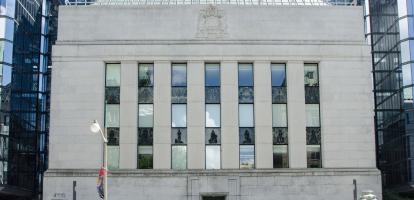The multilateral trading order was in terrible disrepair long before Russia’s illegal invasion of Ukraine. The Ukraine war has made things much worse, adding tremendous stresses on an increasingly fragile set of international trade rules, personified by the World Trade Organization and the liberal trading order it oversees.
Some of these problems were exacerbated by almost two years of COVID-19 restrictions, causing the cancelling of meetings among WTO members, frustrating progress on several fronts. One example is the postponement of last year’s all-important 12th WTO Ministerial Conference (called MC12), which is now rescheduled for June.
Delayed ministerial gatherings and the need for virtual meetings are, in the end, logistical, nuisance-type inconvenience factors. More serious is the deep-seated malaise in the organization on existential levels. The Ukraine crisis has brought much of this into sharper focus. Whatever happens on the ground militarily, the effect of unprecedented Western sanctions on Russia and on financial and banking transactions with that country is staggering, with huge effect on the global economy generally. The WTO has had no role or involvement in any of this.
Economic sanctions are not a new phenomenon. They’ve been around for centuries, as Nicholas Mulder has explained in his book The Economic Weapon: The Rise of Sanctions as a Tool of Modern War. Over the past two decades, their use has become even more dominant as a force in international relations. While mostly applied unilaterally, sanctions can be used with devastating effect when applied collectively, as the Ukraine war has shown. In all of these developments, the WTO is a bystander because of the wide exemptions in the rules, giving members effectively carte-blanche to take national security actions as they determine.
We saw the use of these exemptions during the Trump administration, when tariff surcharges were applied under the national security rubric. Even though some challenges to the Trump measures remain on the WTO docket, the fact that its dispute settlement regime no longer works means there’s no possibility of any country getting redress. That’s a key example of the institutional malaise the organization faces.
For many years, there’s been sharp disagreement among governments on how the WTO should develop new global rules for trade in pandemic medicines and climate change, among other critical issues, illustrating its shortcomings as a negotiating forum. Another key issue is Western governments’ concerns about China’s flouting of WTO rules, with the U.S. leading the charge to force that country to meet its trade obligations.
The Ukraine crisis has brought these limitations into sharper focus. Two former high-ranking American officials, Rufus Yerxa and Wendy Cutler, recently wrote that the Russian invasion could have “dramatic meaning for the WTO’s future,” adding tremendous stresses on the organization when one of its members has just invaded another.
Private sector action, ahead of any kind of newly formulated international rules, is another factor affecting the WTO’s relevance. Companies are moving forward in response to widespread public disgust over Russian aggression, acting quickly and decisively on their own. While governments have forced some of this in the financial sector, in other areas, companies such as Meta, Amazon and other media giants have stopped doing business in that country. Other companies have unilaterally shut down operations and written off their investments, outside of government laws or decisions by intergovernmental organizations.
Another illustration is in the area of climate change and the progress toward a net-zero carbon world, where the private sector has moved ahead by embracing a range of environmental, social and governance (ESG) standards as the WTO is frustrated by internal dissension among its 164 members, unable to even agree on a firm negotiating agenda.
As someone who has spent his professional life advocating for the importance of global order and the multilateral trading system, it’s discomforting to think that the relevance of the WTO, once heralded as a paramount international achievement, is under serious doubt. But the reality of its institutional limitations and its fraught internal political strife has been brought out by the terrible events taking place in Ukraine.
Given the shattering of the rules-based trading order, the damage caused by Russian aggression and what The Economist has called “the waning appetite for globalization,” it may be that the WTO has reached the limits of collective global achievement. Whether the continued fading of the multilateral trading order can be reversed is the central challenge in the days ahead.
Lawrence Herman, a former Canadian diplomat, is counsel at Herman & Associates and senior fellow of the C.D. Howe Institute in Toronto.





